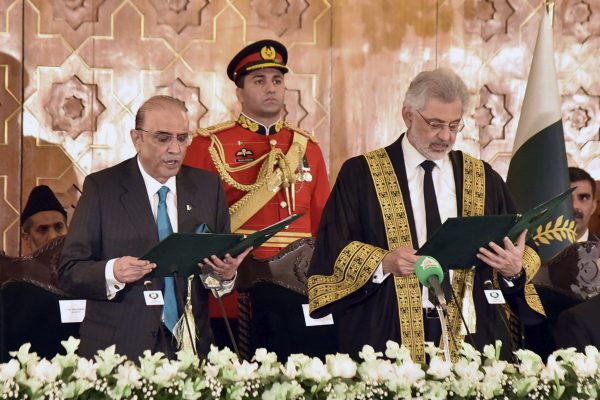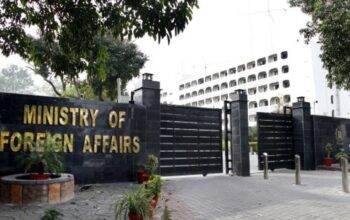By Staff Reporter
ISLAMABAD: The government will push through a constitutional amendment on Saturday to raise the retirement age of Supreme Court and High Court judges, a move that has drawn criticism from key opposition parties who warn that it undermines judicial independence.
The proposed amendment, which is expected to give the executive greater influence over appointments, postings, and transfers of superior court judges, aims to increase the retirement age of Supreme Court judges from 65 to 68 years and that of High Court judges from 62 to 65 years.
The amendments are likely to revise Article 175-A and subsequent clauses related to the Supreme Court, high courts, and the Judicial Commission of Pakistan (JCP). The package may include changes to Articles 177(1) and 180, related to Supreme Court judges’ appointments, and Article 179, potentially enabling the chief justice to retain their post for a longer period. The ruling coalition is considering fixing the tenure of the top judge to three years.
Another amendment may be made to Article 200, allowing the transfer of high court judges without their consent, with the nod of the chief justice of Pakistan and the concerned high courts’ chief justices.
The JCP, established under the 18th Amendment, may also see composition changes. Currently, the JCP recommends appointments, confirmations, and elevations, with the Parliamentary Committee on Judges rubber-stamping decisions.
The package will be tabled in both houses, with sessions convened on Saturday evening – an unusual weekend sitting, despite uncertainty over securing the required two-thirds majority by the ruling coalition. Sessions of both houses have been summoned with only an hour’s gap.
The government expressed confidence in securing 224 votes in the 336-member National Assembly and a two-thirds majority in the Senate. However, analysts say the coalition is short of at least a dozen votes in both houses.
The history of the Pakistani parliament indicates that amendments can pass through unorthodox means. Past precedents, such as Senate Chairman Syed Yousuf Raza Gilani’s election, suggest that passage may be achieved through backdoor deals.
Ruling coalition parties – the Pakistan Muslim League-Nawaz (PML-N), Pakistan Peoples Party (PPP), and Muttahida Qaumi Movement (MQM) – have directed members to remain in the capital over the weekend, ensuring attendance.
The government is courting far-right Jamiat Ulema-e-Islam-Fazl (JUI-F) chief Maulana Fazlur Rehman’s support. If Rehman supports the package, the government will dominate the Senate but remain short of around four to five votes in the National Assembly. Constitutional amendments require an open ballot, making it difficult for lawmakers to conceal their votes.
Despite opposition parties’ strict discipline, media reported that some Pakistan Tehreek-e-Insaf (PTI)-allied lawmakers may defect. It is unclear whether the PTI-led or other opposition groups will be able to prevent the government from amending the constitution. At most, the PTI can try to stir up controversy by announcing protests or seeking support from lawyers and judges.
Barrister Aqeel Malik, Prime Minister Shehbaz Sharif’s aide on legal affairs, confirmed the bill’s introduction. “The bill will be introduced on Saturday and tabled first in the Senate, then the National Assembly.”
Defense Minister Khawaja Asif said the government had secured the required two-thirds majority in the lower house of parliament. “We have completed the number game in the lower house,” Asif told journalists.
The opposition Pakistan PTI party of former Prime Minister Imran Khan views the planned amendment to extend the tenure of Chief Justice Qazi Faez Isa as a “blatant attempt to protect the interests of the current government”.
“Chief Justice Qazi Faiz Isa protected those who targeted us. He took away our electoral symbol. He did not hear our pleas about human rights violations… and now the government and its handlers are employing every possible dirty trick to impose the same Chief Justice once again,” Khan said from the Adiala Jail, where he has been imprisoned for over a year.
“My fellow Pakistanis, if you do not come out against the extension of Qazi Faiz Isa today, you will forever remain enslaved.”
However, Isa denied knowledge of the proposal, saying he would not accept any individual-specific plan. Isa, who was appointed in September 2023 and is due to retire in October 2024, will remain in the position for only another month under existing rules.
Some analysts consider Isa fairly sympathetic to the current ruling alliance. Political parties are keen to have loyalists in key positions of the Supreme Court rather than judges who will effectively defend the Constitution and hand out impartial judgments, they added.
“The amendments could undermine the credibility of the chief justice and the Supreme Court, as the extension would be perceived as a politically motivated decision,” an analyst said.
“With the disconnect between the PTI and Isa growing over time, the current government might be attempting to leverage it.”
Isa is under fire for his January 13 ruling that declared the PTI party’s intra-party election illegal, casting a shadow over the integrity of the 2024 general elections. The decision stripped the PTI of its election symbol, while party chief Imran Khan was convicted in three cases before the polls without due process, sparking concerns about judicial interference.
Later, his court also lifted the lifetime disqualification of former Prime Minister Nawaz Sharif, an arch-rival of Khan in the country’s political heartland, Punjab, before the general elections.
The Isa-led court has yet to rule on the trial of civilians in military courts, with over 80 of Khan’s loyalists in military custody. The court has also been silent on the restriction of social media platform X, which has been largely PTI-specific, since the February 8 elections.
Relationships among senior judges are also strained, with judicial politics tied to national politics.
Six Islamabad High Court judges sought guidance from the Supreme Judicial Council on March 25 regarding agency interference in judicial matters. The Supreme Court referred the matter to the government for an inquiry commission, which is still pending. Isa has yet to publicly endorse the stance of the six IHC judges on agency interference. The Supreme Court’s failure to create deterrents against such interference has allowed attacks on independent judges to continue under Isa’s leadership.
The controversy surrounding the constitutional amendment has become increasingly contentious, even before the matter is taken up in the parliament, raising questions about the government’s intentions and the potential implications for the judiciary.
Malik said the proposed law reform would not be person-specific and aimed to introduce judicial reforms with “good intentions”. “The legislation, if presented, would not violate anyone’s fundamental rights.”
PTI’s general secretary Salman Akram Raja, however, disputed the government’s claims, saying the constitutional reform aimed to extend the tenure of a favored judge. “No one, including CJP Isa, should accept the amendment,” Raja said, warning that it would destroy the institution.
Copyright © 2021 Independent Pakistan | All rights reserved




